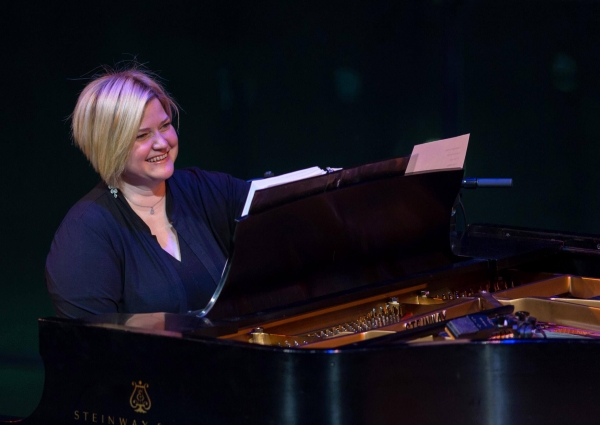Broadway Musical Director Mary-Mitchell Campbell Has a Second Full-Time Gig: Fighting Poverty
Each segment of TheaterMania's "Broadway Gives Back" series highlights the service work of our friends in the theater community.
Mary-Mitchell Campbell has the same number of hours in her day as the rest of us, yet somehow she manages to accomplish twice as much. As a respected Broadway musical director, Campbell has worked on shows like Company and the recent Broadway adaptation of Big Fish while simultaneously heading up her nonprofit ASTEP.
ASTEP, which stands for Artists Striving to End Poverty, aims to change the lives of underprivileged children across the U.S. and around the world through art and arts education. Campbell recently volunteered a few precious minutes of her time to speak to TheaterMania about the power of art to open doors, inspire imagination, and improve the world.

How did ASTEP come to be?
In 2004 I had been through a really bad divorce, so I went to India to see what real problems looked like because I was a little bit mired in my own. I came back with two really serious truths. One was that I was responsible for what I knew. And the other was that I was much more conscious of not feeling guilty for being so wealthy because I feel like that guilt is a useless emotion. It's the thing that makes us not want to look at everything because that guilt and shame for having things makes us try to cut off from all of those people. And I thought, that's not what this is about.
At the same time, I was working at Juilliard, and there was a guy, Mauricio Salgado (ASTEP program director). He was from Homestead, Florida, which was destroyed by Hurricane Andrew and was never rebuilt. Mauricio had this amazing experience [at Juilliard] and wanted to take it back home to the nonprofit his parents run, focused on predominantly Hispanic migrant families. He wanted to run an arts camp for them. So he got a bunch of Juilliard kids together, and I sort of served as mentor.
Tell me about ASTEP.
ASTEP is about a philosophy of how art creates and changes communities. Because what's awesome about ASTEP is it's such a side entrance. Kids don't see us coming because we're like your fun aunt and uncle that came to do some project with you. The cool thing about that is the kids will bring up what they need to talk about. When we were in Africa, we were doing lots of playwriting and we would give them specific prompts and have them write their own plays and no matter what prompt we gave them, they would end up talking about rape, and they would end up talking about HIV. [They’d say], "OK, the puppy dog is going through the wood and it runs into the butterfly and it chases the butterfly and then it finds a girl and she's laying there and she's been raped. And she has HIV." And then they would say, "Well, actually, it's not about that girl. That girl is me." That kind of information comes out because it's safe and because it doesn't feel like you're being interrogated in any way. So that kind of work is life-altering.
You're also dealing with parents who aren’t encouraging kids to dream big because they don't want their dreams to be crushed, so there's no push for imagination. So we bring in a world of safe space where it's all about imagination: "Let's imagine that you could go to college, and imagine what you would do if you had a college degree."
How can people help?
If they're interested in volunteering, we have lots of different opportunities, from spending a day at a homeless shelter in Brooklyn, doing a master class/performance and talking with the kids, to volunteering for a very intense period of time in New York City, Florida, or even Africa or India. Students can start a college group at school. Or you can volunteer at the office and do administrative work. And obviously anyone can donate money.
How hard is it for you to balance your responsibilities as a musical director with your job at ASTEP?
I think the best thing I can say about it is that I wake up every day with a sense of purpose and meaning. Most days I really love my jobs. There are things when you start a nonprofit…pretty serious things…that you don't anticipate you'll ever be dealing with. We had a suicide in India with a sixth-grade girl who wasn't in our program but who was really close to a lot of kids in our program. So there are definitely aspects of it that have been challenging and unexpected and really serious.
There are times when that gets overwhelming, but that's when I feel like being an artist is really useful, because you can just do a musical and it makes everything better and no one's going to die, most likely. Very rarely is there a musical-theater emergency of any kind, authentically. I think the balance of being able to go and play piano while Kristin Chenoweth sings "Popular," that's helpful.
Is there any other advice that you'd give to people trying to balance philanthropy and other work?
I think you can't be whatever you want to be until you have something to say. And I think you don't have something to say until you know who you are, which is a lifelong process. But to fast-track learning who you are throws yourself way out of your comfort zone. Because that is the way you really come face-to-face with who you are.










